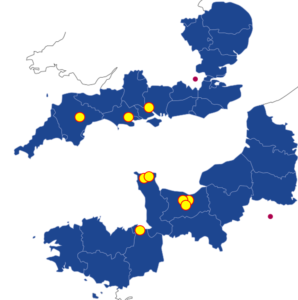
The new eco-engineering units developed by the MARINEFF project will aim to improve the ecological status of the waters in 7 different sites spread over the project area. The ecological status and biodiversity will be measured pre and post deployment in a standardised way to ensure accurate and valid comparison. An increase of at least 15% in the 6 main descriptors of the Water Framework Directive compared to the pre deployment state will indicate whether or not the eco-engineering units have been successful.

The economic profitability of the eco-engineering units will be guaranteed by working with well-known materials and construction techniques that will limit additional costs (<5%) compared to existing methods and solutions. The Marineff will accelerate the market launch of our solutions through the creation of training courses (WP T3) and business models for engineers, contractors and other key stakeholders.
WP M – Management
Leader: BUILDERS Ecole d’ingénieurs (ESITC Caen), co-leader University of Southampton
Coordination tasks cover administrative, legal and financial activities. Daily management is structured to ensure communication between partners, organization and follow-up of meetings, coordination, follow-up and control of activities, supervision of technical progress, in parallel with quality assurance and implementation of financial procedures
WP C – Communication
Leader: BUILDERS Ecole d’ingénieurs
The communication of the project will be led by ESITC and co-piloted by US with the support of BU and PNA, and will aim to raise awareness of the MARINEFF project as well as recognition of the role of the FCE programme and the European Regional Development Fund in achieving concrete results in terms of improving coastal and transitional water quality.
WP T1 – Pilot operation : Eco-engineering unit for the creation of a specific habitat
Leader: University of Southampton
The objective of WP T1 is to develop a new eco-engineering solution capable of improving the survival and reproduction of native oysters (Ostrea edulis) in the wild. Collaboration between University of Southampton, ESITC and TPC will produce an optimised technical design of the eco-engineering solution. They will also improve the transferability of the solution by accompanying a long-term restoration strategy valid for the entire FCE area. After these optimizations, three experimental sites in France and the UK have been chosen to deploy to final eco-engineering units which will occur in early 2020. Twenty-six units will be deployed in the Solent, UK and 4 in Ouistreham and Dinard in France.
WP T2 – Eco-engineering units for the improvement of the ecological status of the marine environment
Leader: BUILDERS Ecole d’ingénieurs, co-leader Bournemouth University
In WP T2, we are developing innovative eco-engineering units that directly recreate lost habitats within them. To achieve this, the partnership brings together marine biologists, materials experts and engineering professionals. The joint formulation of cements materials that incorporate features that occur in natural habitats will make it possible to develop 3 units:
- artificial rock-pools
- breakwater blocks
- boat mooring bases for water craft
To ensure the transferability of our results throughout the Channel, our eco-engineering units will be deployed at 5 sites: 1 pilot operation in Cherbourg, 1 pilot operation in Dinard and 5 experimental sites including Bournemouth, Isle of Wight, Ouistreham, Bernières-sur-mer and Dinard Bay.
WP T3 – Professional network
Leader: Bournemouth University / co-leader Ports Normandy Association
The innovations developed by MARINEFF can only be carried out in consultation with all stakeholders. However, to ensure the effectiveness of the project, only a limited number of stakeholders can be included in the project as a project partners. This is why we have decided to deploy a professional network with the following objectives: to disseminate results and accelerate the market launch of eco-engineering solutions through dedicated training; to recruit stakeholder representatives who will be integrated into WP T1 and T2 working groups; and to ensure the sustainability of the results after the end of the project through the continuation of this network.


